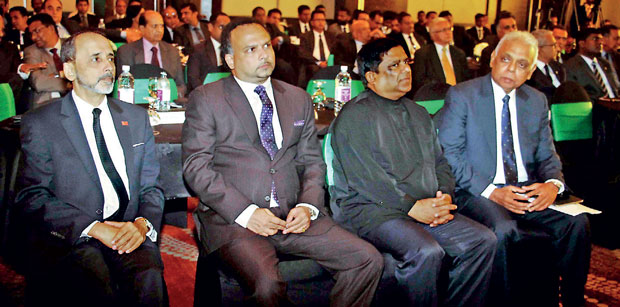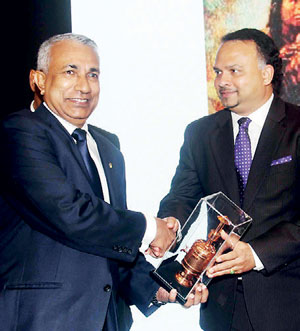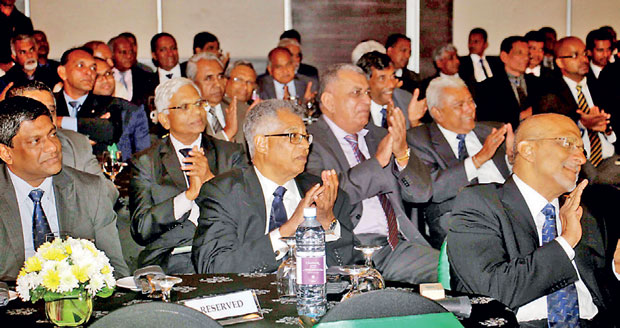04 Oct 2017 - {{hitsCtrl.values.hits}}

Addressing the 27th AGM of the Sri Lanka Tea Factory Owners Association (SLTFOA), the Plantation Industries Minister Navin Dissanayake announced that the ministry is expecting to launch the loan scheme worth of US$100 million from Japan including Japanese government in December or early January next year.

He said that the loan scheme is aimed at modernizing the country’ tea factories. The tea factory owners will be able to access the loan scheme through the People’s Bank at a low interest rate of four to five percent.
The SLTFOA AGM was also graced by Finance and Media Minister Mangala Samaraweera, Home Affairs Minister Vajira Abeywardena, Lands and Parliament Affairs Minister Gayantha Karunathilaka and Sri Lanka Tea Board Chairman Rohan Pethiyagoda.
The minister revealed that the Ceylon Tea global promotional campaign which was delayed for over seven years would finally commence in January next year. He said: “We have selected an advertising manager at last and will put it for Cabinet approval.” The Ceylon tea promotion fund currently has an excess of US$40 million which was funded through the Tea Promotion and Marketing levy of Rs.3.50 for every kilo imposed on tea exporters.”

Addressing the occasion, Finance and Media Minister Mangala Samaraweera said the Working Capital Loan scheme for registered tea factories which was launched in 2015 had reached seven billion Rupees in loans. He further added, “The Ministry of Finance allocated Rs.500 million to settle interest subsidies.” The scheme was launched to support the modernization of tea factories to compete internationally.
Dissanayake asserted the tea industry was over-regulated, obstructing the growth of the industry. Making a comparison with the regulation of the tea industry and the apparel sector, he pointed out that less regulation had helped the apparel sector to become the top export commodity within a short period of time. Therefore, he urged all stakeholders in the tea industry to agree with a way to de-regulate the tea industry.
The minister urged the tea industry to reduce its dependency on state subsidies by setting buffers to self sustain during crisis periods when global tea prices fall sharply. He revealed that the government had provided eight billion Rupees as subsidies to the sector, to minimize losses occurred during last tea price fall.

Commenting on the number of tea factories, Dissanayake said: “There are over 700 tea factories in the country including RPCs which is way too much and it should not be a measure of success. Since I became the Plantation Development Minister, I have stopped issuing new licenses to factories. There were too many licenses being issued during the past 15 years.” He said that strengthening and consolidation of tea factories while expanding profitability was the urgent need for the country.
The minister assured the present and the prime minister is on the line to support the country’s tea industry. He said it’s the first time that the Chairman of the Tea Board of Sri Lanka (TBSL) and the Minster of Plantation is working together, hence he urged the stakeholders of the tea industry to capitalise on this opportunity to bring in necessary reforms to develop the tea industry. However, he said: “The decision of Tea Board of Sri Lanka can be made much quicker, sometimes I’m frustrated. I am not blaming anyone as it’s caused by rules and procedures do not allow us to move quicker and faster way.”
Commenting on the coconut industry, Dissanayake added: “The coconut industry is going through bit of a crisis at the moment. So I want to get some kernel down. I want to enable desiccated coconut millers to import coconut as husked nuts or as fresh kernel. This is only for value addition and export. According to the current act we can’t bring anything unless the quarantine agrees to it. These are very archaic acts which are not suitable for a modern economy. These are acts that were brought in the 1960’s and 1970’s when there were very much socialist kind of thinking where the government monopoly was the norm of the day. But we have de-regulated and will have to de-regulate further.”
Speaking on tea blending, he added: “Most of the tea industry opposes allowing tea blending. I as a ministry who wants change, who like to break government red-tape, to move forward and encourage new innovations, I would be very happy if this idea can be entrained. However, as a minister I have to accept the reality as the majority doesn’t accept liberalising tea blending. When I asked the proposers and supporters if the tea blending policy would bring the tea prices down, they didn’t give a definite answer. Can you imagine the social chaos would cause if the prices come down? Therefore, I as a politician cannot risk it, sometimes it’s better to go stick with status quo. However, we also must change.”
He further said: “Considering all this factors, replanting of tea is the way forward. However, it’s not happening at the moment. We have to re-plant, the nourishment of our soils have gone down over past 40 year period. That’s why we need a financial model for tea.”
Highlighting the issues of the industry, the minister said: “We can easily sell 300 million kg of tea; however, the issue is really quality, sustainability and profitability of all stakeholders of this model.”
Commenting on the wage issues between RPCs and workers, the minister revealed: “RPC are concerned, we already have introduced an outgrow model, so that workers can get a higher wage according to the way they pluck. Then, we want to consolidate that process in next round of wage negotiations. So there will be more harmony between workers and employers. This model would allow workers to feel more dignified and they will have some rights over a plot of land.”
27 Nov 2024 59 minute ago
27 Nov 2024 3 hours ago
27 Nov 2024 4 hours ago
27 Nov 2024 4 hours ago
27 Nov 2024 4 hours ago